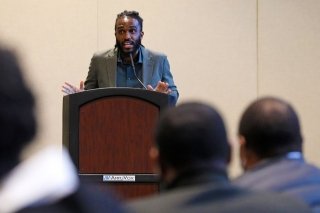Nyle Fort gives keynote address at 27th annual Sankofa Conference
Bloomsburg
Posted

Nyle Fort gave the keynote address at BU’s 27th annual Sankofa Conference. The address, “Critical Race Theory: A Country in Crisis,” focused on what critical race theory is and why it is so important.
Fort is a minister, activist, and scholar who addresses racial and social justice issues through his scholarship, community-based organizing, and large-scale social movements. He earned his B.A. in English from Morehouse College, and his Ph.D. in Religion and Interdisciplinary Humanities with a concentration in African American Studies. He is a professor at Columbia University.
Madelyn Rodriguez, executive director of diversity, equity, and inclusion at BU delivered opening remarks. She challenged the audience to get out of their comfort zone. “Truth will be presented to you today,” Rodriguez said, “If you’re uncomfortable, it’s all right. You’re learning.”
Fort’s began his presentation by talking about the stories his mother would tell him and his brother at night as children. “We didn’t have much growing up, but we had mom’s stories,” said Fort. “In momma’s dreams, we were free, and we were princes when in school where we were just a statistic. Stories matter, especially the ones we tell about this country. That is why critical race theory is so important.”
Critical race theory, according to Fort, argues that racism is not about individual prejudice, but rather it is a social construct that affects every aspect of American society. It affects everything from healthcare to housing to the prison system to our education.
“It’s the reason that today in New Jersey a white family’s net worth is worth over $160,000 more than a Black family’s,” said Fort. “After World War II when the United States was trying to build a middle class, Black soldiers were left out when soldiers were being offered the G.I. Bill.”
Critical race theory challenges stories that have been told to us for generations. Fort discussed Dr. Martin Luther King Jr. as an example. “He’s been reduced to four words in our stories about him when he had much more to say. He called the United States a sick nation, he defended rioters despite his convictions of nonviolence, but he never lost hope in the possibility of transforming society,” said Forte.
Fort closed his address with a question to the audience: “What story is your life telling?” Fort asked. “What will people say about you when all is said and done?”
Following his address, Fort held a question and answer session with attendees.



